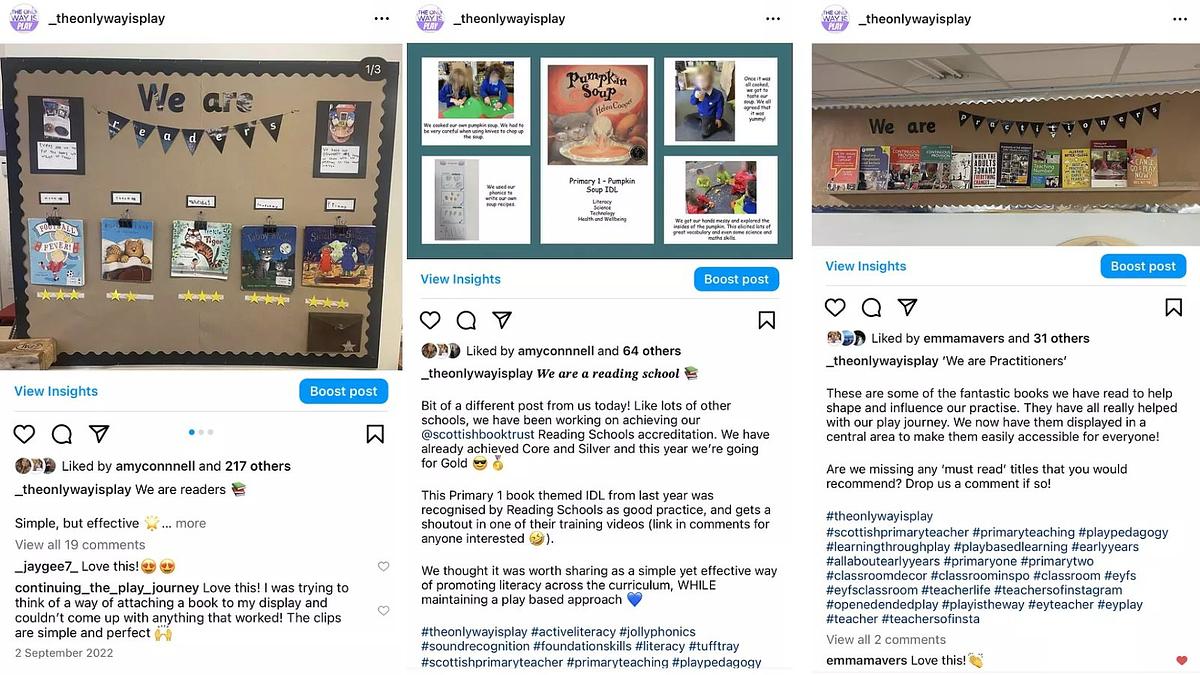Aerila, J. and Merisue-Storm, T. (2017) 'Emergent Readers and the Joy of Reading: A Finnish Perspective', Creative Education, 8, pp.2485-2500.
Anang, A. J. (1982) What Is Reading?: A Social Theory of Comprehension Instruction. Michigan State University: Michigan.
Baker, S. and Bickler, S. (1998) Book Bands for Guided Reading. London: Institute of Education.
Baker, T. L., Wise, J., Kelley, G., and Skiba, R. J. (2016). 'Identifying barriers: Creating solutions to improve family engagement', School Community Journal, 26(2), pp.161-184.
Blake, J., and Maiese, N. (2008) 'No fairytale. . . The benefits of the bedtime story', The Psychologist, 21(5), pp.386–389.
Book Trust (2019) Parents Swap Books for Tech at Bedtime (accessed 22nd May 2022).
Bradshaw, P. (2011) Growing Up in Scotland: Changes in Child Cognitive Ability in the Pre-School Years. Scottish Government, Edinburgh.
Campbell, C. (2011) How to involve hard-to-reach parents: Encouraging meaningful parental involvement with schools (accessed 15th May 2022).
Carnegie Trust UK (2016) Shining a Light (accessed 20th May 2022).
Carstens, K.J., Mallon, J.M., Bataineh, M. and Al-Bataineh, A., (2021) Effects of Technology on Student Learning. Turkish Online Journal of Educational Technology, 20(1), pp.105-113.
Centre for Literacy in Primary Education (2015) Reading for Pleasure: What We Know Works (accessed 23rd April 2022).
Centre for Real-World Learning (2010) The impact of parent engagement on learner success - a digest of research for teachers and parents, Research into Practice, GEMS Education.
Chambers, A. (1994) Tell Me: Children, reading and talking. Newtown: PETAA. Primary English Teachers Association Australia.
Channa, M. A., and Nordin, Z. S. (2015) 'Social cognitive theory and the zone of proximal development in the learning of reading comprehension', Science International, 27(1).
Clark, C. and Rumbold, K. (2006) Reading for Pleasure: A Research Overview. London: National Literacy Trust.
Corbett, P. and Strong, J. (2022) Talk for Reading. London: David Fulton.
Coventry University (2016) Reading for Pleasure: reviewing the evidence. Centre for Research in Psychology, Behaviour and Achievement.
Education Endowment Foundation (online) Working with Parents to Support Children's Learning (accessed 20th May 2022).
Education Endowment Foundation (online) Why Focus on Reading Fluency? (accessed 1st June 2022).
Education Scotland (2010) Curriculum for Excellence (accessed 24th April 2022; page no longer available 2024).
Education Scotland (2015) How Good is Our School (4th Edition) (accessed 20th May 2022).
Education Scotland (2018) Family Learning Framework. Advice for Practitioners (accessed 24th April 2022).
Education Scotland (2019) Engaging parents and families - a toolkit for practitioners (accessed 12th May 2022).
Gambrell, L. B., Palmer, B. M., Codling, R.M., and Mazzoni, S.A. (1996) 'Assessing motivation to read,' The Reading Teacher, 49, pp. 518–533.
Garces‐Bacsal, R. M., Tupas, R., Kaur, S., Paculdar, A. M., and Baja, E. S. (2018) 'Reading for pleasure: whose job is it to build lifelong readers in the classroom?' Literacy, 52(2), pp.95-102.
Goodall, J., & Montgomery, C. (2014) 'Parental involvement to parental engagement: A continuum', Educational review, 66(4), pp.399-410.
Goodman, K. S. (1969) 'Analysis of Oral Reading Miscues: Applied Psycholinguistics'. Reading Research Quarterly, 5(1), pp.9–30.
Greef, E. (2017) 'What Does the Library Have to Do With It? The Success of Finnish Education in PISA Tests and the Role of School and Public Libraries', Synergy, 15(1).
Hampden-Thompson, G. and Galindo, C. (2017) 'School-family relationships, school satisfaction and the academic achievement of young people', Educational Review, 69 (2). pp. 248-265.
Harris, A. and Goodall, J., (2008) 'Do parents know they matter? Engaging all parents in learning', Educational research, 50(3), pp.277-289.
Hatchett, D. (2015) 'Closing the achievement gap: the critical importance of parental engagement', Oxford University Press
Hattie, J. (2008) Visible learning: A synthesis of over 800 meta-analyses relating to achievement. Routledge.
Hurst, B., Wallace, R., and Nixon, S. B. (2013). 'The impact of social interaction on student learning', Reading Horizons: A Journal of Literacy and Language Arts, 52 (4), pp. 375-398.
Juel, C. (1988) 'Learning to read and write: A longitudinal study of 54 children from first through fourth grades', Journal of Educational Psychology, 80, pp.437-447.
Krashen, S. (1993) The Power of Reading. Englewood, Col. Libraries Unlimited, Inc.
Lucas, B. (2013) 'Engaging parents: why and how’, Redesigning Schooling, 6.
Mannion, G., Sowerby, M. and I’Anson, J. (2015) How young people's participation in school supports achievement and attainment. Edinburgh, Scotland's Commissioner for Children and Young People (SCCYP).
McGeown, S. and Laburn, R. (2020) Tackling the Equity Gap Through Reading (accessed 20th May 2022).
Moss, J. F. (1976) 'The bedtime story and language development', American Journal of Diseases of Children, 130(2), pp.180-183.
National Improvement Framework Unit (2019) Scottish National Standardised Assessments: purpose and use (accessed 23rd April 2022).
Nieporent, F (2021) What is Reading Fluency? And why is it important?
OECD (online) Reading Performance (PISA) (accessed 13th May 2022).
OECD (2015) Improving Schools in Scotland: An OECD Perspective. (accessed 30th April 2022).
OECD (2021) 21st Century Readers: Developing Literacy Skills in a Digital World (accessed 20th May 2022).
Roffey, S. (2012) Developing positive relationships in schools. In Positive relationships (pp. 145-162). Springer, Dordrecht.
Sacker, A., Schoon, I., and Bartley, M. (2002) 'Social inequality in educational achievement and psychosocial adjustment throughout childhood: magnitude and mechanisms', Social science & medicine, 55(5), pp. 863-880.
Samuels, S. J. (2006) 'Toward a Model of Reading Fluency', What research has to say about fluency instruction, pp. 24–46.
Scottish Government (online) Scottish Index of Multiple Deprivation (SIMD) 2020 (accessed 23rd April 2022).
Scottish Government (2006) Scottish Schools (Parental Involvement) Act (accessed 17th May 2022).
Scottish Government (2010) Literacy Action Plan: An Action Plan to Improve Literacy in Scotland (accessed 30th April 2022).
Scottish Government (2016a) Scottish Survey of Literacy 2016 (accessed 30th April 2022).
Scottish Government (2016b) Enhancing learning and teaching through the use of digital technology (accessed 20th May 2022).
Scottish Government (2019) Programme for International Student Assessment (PISA) 2018: highlights from Scotland's results (accessed 30th April 2022).
Scottish Government (2020) Scottish Household Survey 2019: Annual Report (accessed 1st June 2022).
Scottish Government (2021a) Achievement of Curriculum for Excellence Levels 2020/21 (accessed 23rd April 2022).
Scottish Government (2021b) Education – Achieving Excellence and Equity: national improvement framework and improvement plan 2022 (accessed 21st April 2022).
Scottish Government (2022) Scottish Attainment Challenge: framework for recovery and accelerating progress (accessed 23rd April 2022).
Soso, E. and Ellis, S. (2014) Closing the Attainment Gap in Scottish Education. The Joseph Rowntree Foundation. University of Strathclyde.
Swain, J. (2009) 'Evaluating the impact of family literacy,' Basic Skills. Bulletin No. 73, pp.4-5.
Ukkola, A. and Korkeamaki, R. (2017) 'Engaging Students in the “Joy of Reading” Programme in Finland', Improving Reading and Reading Engagement in the 21st Century, pp. 143-165.
Wantchekon, K. and Kim, J. (2019) 'Exploring heterogeneity in the relationship between reading engagement and reading comprehension by achievement level', Reading & Writing Quarterly, 35(6), pp. 539-555.
Wigell-Ryynanen, B. (2011) Counsellor for Cultural Affairs, Ministry of Education and Culture. Pers. Comm., 3 October.
World Economic Forum (2016) The Future of Jobs (accessed 20th May 2022).
Writer, S. (2018) 'The Bedtime Story: A New Chapter', Indian Journal of Health & Wellbeing, 9(1), pp.155-157.



